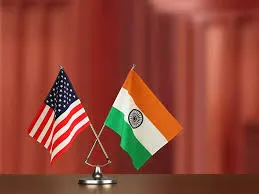New Delhi – While the world reacts sharply to President Donald Trump’s 26% tariff hike, India is taking the road less traveled. Instead of retaliating like China or Canada, New Delhi is choosing strategic diplomacy to protect its exporters and strengthen ties with the US.
India has decided not to match the tariff move, nor will it lower its current tariffs on American goods. Instead, it is focusing on reshaping the trade equation to ensure a “win-win” agreement for both sides.
Jaishankar-Rubio Call: Trade Deal Talks Gain Momentum
On Monday, External Affairs Minister S Jaishankar and US Secretary of State Marco Rubio had a productive phone conversation, where both agreed to fast-track a bilateral trade deal, aiming to conclude it by autumn 2025.
“Good to speak with Secretary Marco Rubio today… Agreed on the importance of the early conclusion of the Bilateral Trade Agreement,” Jaishankar said in a post.
The call also covered regional and global issues, including the Indo-Pacific, Middle East, Europe, and the Caribbean.
India Plays Smart, Studies Tariff Loophole
According to Reuters, India is closely reviewing a clause in Trump’s tariff order that allows relief to nations making “significant steps to remedy non-reciprocal trade arrangements.” Officials believe this gives India an edge over countries like China, Vietnam, and Indonesia, who face steeper tariff barriers.
India’s proactive approach—having already initiated trade talks before Trump’s announcement—places it in a stronger position to negotiate.
India’s Friendly Moves Toward US
To ease trade tensions, India has already made several concessions:
- Lowered tariffs on premium US motorcycles and bourbon whiskey
- Eliminated digital service taxes that impacted tech giants like Google, Amazon, Meta, Microsoft, and X
Meanwhile, the Commerce Ministry is assessing the real-time impact of Trump’s tariffs, especially on vulnerable sectors like diamond exports, and exploring new trade opportunities.
India-US Economic Ties: Stronger Than Ever
The India-US relationship is built on shared democratic values, strategic interests, and a strong people-to-people connection. Both nations are aiming to double bilateral trade to $500 billion by 2030, up from over $190 billion currently.
In FY 2023-24:
- The US was India’s third-largest FDI source with $4.99 billion
- Indian firms invested over $40 billion in the US, creating 425,000 American jobs
Bottom Line:
India is playing the long game—opting for strategic trade diplomacy over knee-jerk retaliation. As Jaishankar and Rubio push for an early trade agreement, this approach could turn Trump’s tariff challenge into a major economic opportunity for India.




















